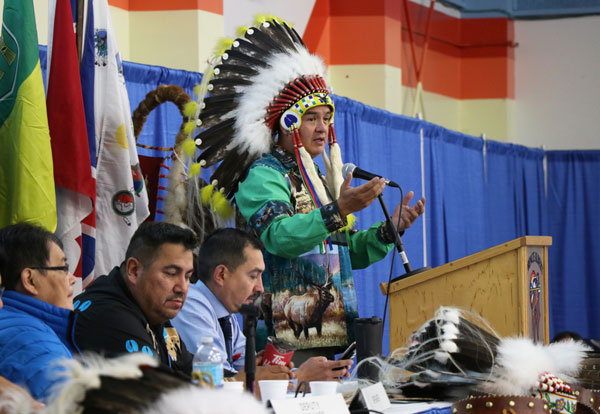Local Journalism Initiative
Re-elected FSIN Chief Bobby Cameron said he has a full slate of things that need to be done and he’s already focused on the next steps.
Cameron defeated Robert Merasty with a strong 75.3 per cent of the 992 votes cast on Oct. 28 in the FSIN election. Cameron said keeping his seat brings continuity to the organization.
“Now we can carry on with the important work we’ve been lobbying for, for several years now,” Cameron said in an interview the day after his third election win.
The group has been working for years on negotiations with the federal government on the concept of treaty right to shelter.
“That is securing a greater investment to build more houses on our First Nations,” he said.
First Nations need capital infrastructure to address the shortage, he added. Lobbying for treaty rights is the core purpose of the FSIN and why the group was created. The housing issue has been a priority for six or seven years.
“That’s why we’re elected,” said Cameron. “We don’t give up. If it’s going to improve the lives of our First Nation people on reserve. We’ll go the distance.”
He said the housing shortage on reserve is causing a crisis because it’s so large, and that’s something all of the First Nations have seen.
Another goal is to amend federal legislation that requires First Nations to form partnerships with other governments for projects like casinos.
“The seat of gaming and casinos were created and developed by First Nations on First Nations land,” Cameron said. “In order to get into the business of gaming, we had to have a partnership with the provincial government.”
He point out that provincial crown corporations like SaskPower or Sasktel do business on First Nation lands with no input from Indigenous governments and said that they should be left to run casinos and gaming on their own.
They are looking to “seek and secure jurisdiction for First Nation’s people, and in gaming in particular”, said Cameron.
“Once we secure this, it means more revenues for our First Nation’s people. More revenue equals more opportunities for investments directly at the First Nation level that they prioritize,” he explained.
Having their own revenue means they can choose the priority of where it should be used which could range from youth or elder projects, housing projects, wellness centres and more.
A third priority is putting into action Bill C-92, which would return jurisdiction of child and family services to indigenous governments, a long standing issue.
“These things take time but that’s why we’re elected,” Cameron said. “We’re elected to never give up and continue the good work.”
Whether with the previous executive or the newly elected people, all have a very similar purpose and that is to advance the cause of the people they represent.
“We all have the same attitude and the same mentality; advancing and improving the lives of First Nation’s people both on and off reserve, that’s our common goal,” he said.
FSIN is at the start of another push to change how First Nations and law enforcement intertwine.
“Justice was one of our rights under treat,” said Cameron, “where the red coats and the RCMP were to maintain peace and order and safety on our First Nations.”
In some cases, RCMP detachments on reserve are now taking direction from band leadership, he explained.
FSIN has been working on developing their own law enforcement organization titled the First Nations Front Line Officers association (FNFLO) which would act as tribal police.
“Our own First Nations performing the duties to maintain peace and order, good will and health on our First Nations,” said Cameron, adding that there are already thousands of aboriginal officers in other organizations.
They are looking for both support and full federal funding for the service but the idea is in early stages still.
“Those are long term goals,” he said.


